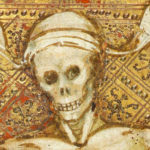We run our website the way we wished the whole internet worked: we provide high quality original content with no ads. We are funded solely by your direct support. Please consider supporting this project.

6 Things the Church Fathers Can Teach Us about Spiritual Warfare
Image by Christina Saint Marche via Flickr
Unlike our thinking today about the source of good and evil in the world, the early church fathers, including Irenaus, Athenagorus, Origen, and others before Augustine, possessed a warfare worldview. Here are 6 ideas that are common in their writings:
- The Reality of the “World-in-Between”
The church fathers assumed that in-between humans and God there exists a vast society of intelligent, free, spiritual beings whose behavior significantly impacts human existence. The early fathers are all in general agreement that the key to understanding evil in a world that has been created and is yet sustained by an all-good and all-powerful God is to understand this “world-in-between.”
- The Freedom of the “World-in-Between”
The fathers tirelessly stressed the fact that the inhabitants of the spiritual realm, like the inhabitants on earth, are free. “Just as with men,” Athenagorus writes, angels “have freedom of choice as to both virtue and vice.” God’s aim in creation requires that his creatures be morally responsible. This moral responsibility requires freedom. And freedom, by definition, cannot be programmed.
- The Morally Responsible Hierarchy of the “World-in-Between”
The insight concerning the freedom of angels was combined with a hierarchical understanding of created reality in which the moral responsibility of one in a ‘higher’ position encompasses the welfare of those in ‘lower’ positions. For instance, when kings turn evil, their subjects suffer. So too, when angels rebel, all those under them suffer accordingly.
- Evil Does Not Go Back to God
All of the pre-Augustinian fathers, in sharp contrast to Augustine and most who followed him, saw clearly that this freedom entails that God is not in meticulous control of the cosmos. “There is no coercion in God,” wrote Irenaeus, a statement that sums up the conviction of this period. And this implies that evil cannot in any way be traced back to some secret dimension of God’s omnipotent will. Not one author in the pre-Augustinian period expresses any of the awkward discomfort we find in and after Augustine with trying to affirm a good divine purpose for particular blatantly evil events.
- Evil Agents and Evil in our World
Because of the hierarchical structure of the cosmos, the fathers suggest that a dimension of both moral and natural evil is rooted in transcendent spiritual beings who have become evil. Without excusing our sin, these fathers understood that there is at times a dimension to our sinning that is beyond our control. We are undoubtedly responsible for our actions, for we are responsible for relinquishing our self-control, as Origen insists. But a full account of our behavior or attitudes is not possible so long as we consider only variables that are within our control.
In the same way, this applies to natural evil. When angels of nature turn ugly, the nature they are over becomes a weapon.
- Satan and Cosmic Structural Evil
Evil, in the view of the fathers, was not understood as simply something that occurred in an otherwise pure and pristine creation. Rather, the creation itself was understood by these theologians to be adversely and radically affected on a fundamental level by cosmic forces of evil. Another way of making this point is to note the remarkable scope of authority that many of these fathers ascribed to Satan. Their view of the present cosmos was such that they saw everything as being caught up in a cosmic struggle between God and Satan.
Category: General
Tags: Evil, Natural Evil, Problem of Evil, Satan, Sin, Spiritual Warfare, Theodicy
Topics: Spiritual Warfare, Cosmic Conflict
Related Reading

Theo Graff Podcast: Featuring Jessica Kelley
We have a special treat for you today. T. C. Moore is a great friend of ReKnew and he’s recently started a “Jesus-centered, hip hop flavored, geeky, theological, kingdom exploration” called the THEO GRAFF PODCAST. He’s published four podcasts so far and you’ll want to listen to them all when you get a chance, but we wanted…

Grieving
Henning Mühlinghaus via Compfight Here’s a post by Rachel Held Evans about the shootings in Connecticut today. From the post: So let’s grieve together. And let’s give one another the space to be shocked, to be pissed, to appeal to God, to be angry with God, to find peace in God, to question God, to…

Prayer and Co-Reigning with God
God’s primary objective is a world in which free agents love God and one another. For this to be possible, people need a stable environment and freely chosen, irrevocable, morally responsible say-so. Prayer is simply the spiritual side of our morally responsible say-so. We influence things by what we do through our bodies and in…

Podcast: What is Original Sin?
Greg considers the Augustinian view of original sin in contrast with the Anabaptist view, then offers some of his own specific nuances. http://traffic.libsyn.com/askgregboyd/Episode_0079.mp3

Why did God create me with an uncontrollable sex drive?
Question: Why did God create us with far more of a sex drive than we need for reproduction and far more than we can handle to refrain from sex before and outside of marriage? It seems like a cruel joke! Answer: Sex is a wonderful, beautiful, God-glorifying gift. It’s not just for reproduction–it’s also for…

A Visit to Auschwitz
Ever since I first learned of the full horror of the Holocaust when I was a freshman at the University of Minnesota I have had a kind of obsessive fascination with it. I’ve studied every aspect of Hitler and the Third Reich and about the philosophy that led to their “Final Solution.” In fact, for…
